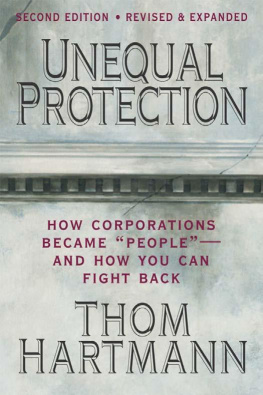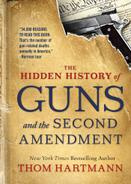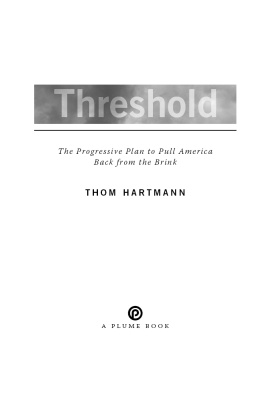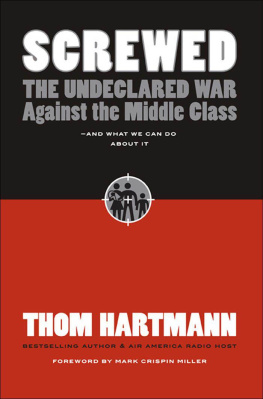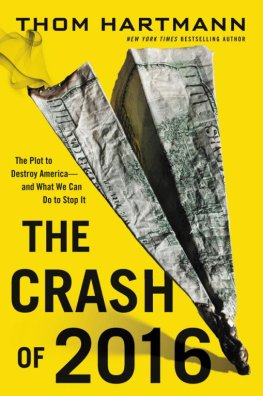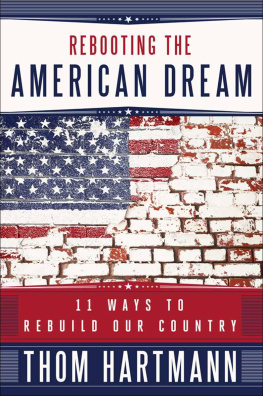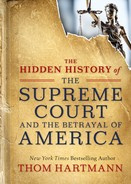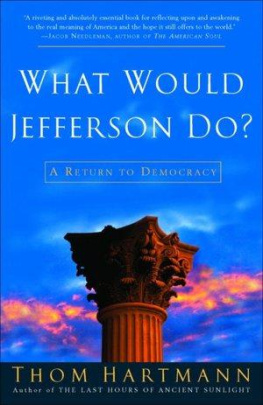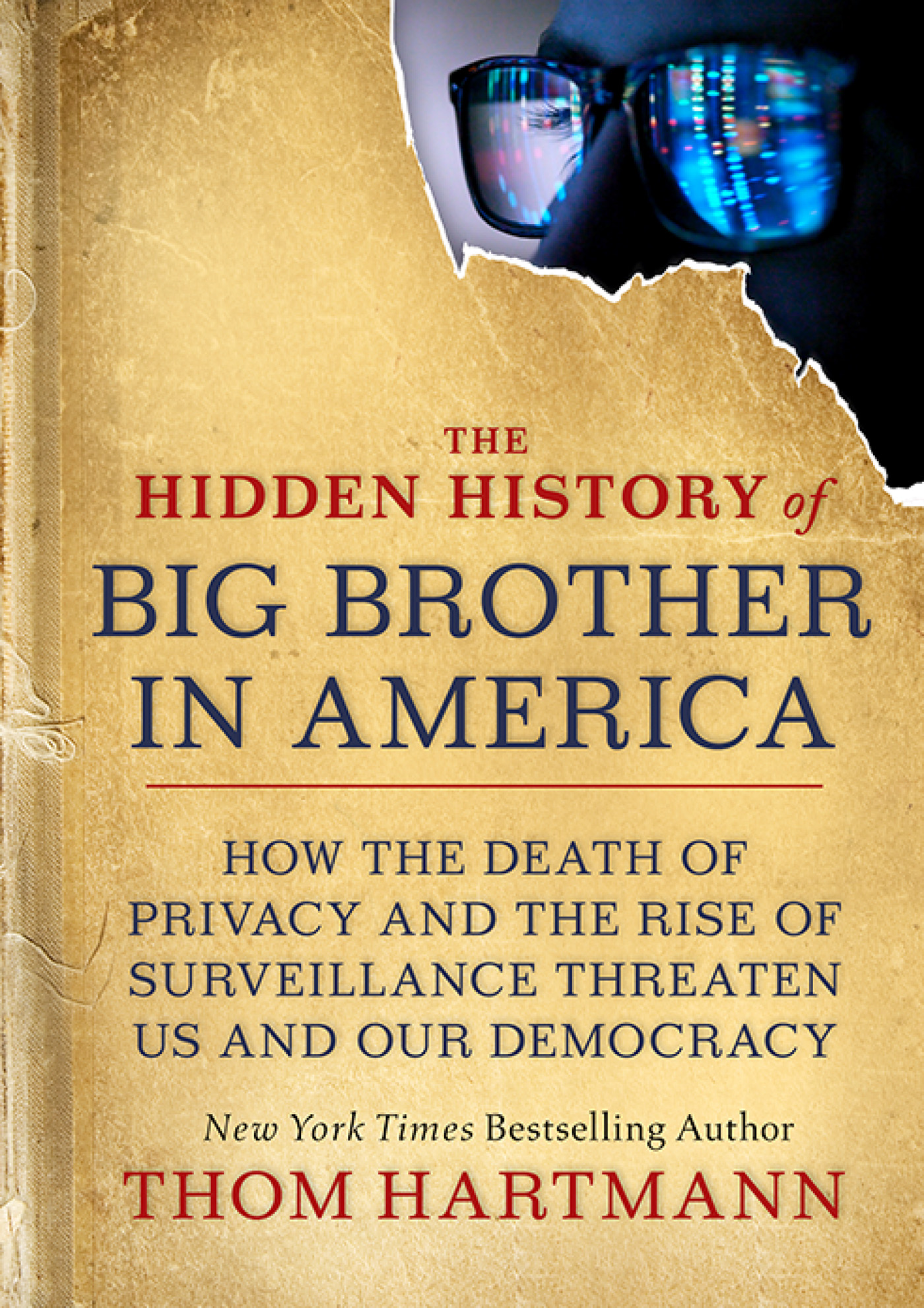Contents
Guide
The Hidden History of Big Brother in America

The Hidden History of Big Brother in America
Copyright 2022 by Thom Hartmann
All rights reserved. No part of this publication may be reproduced, distributed, or transmitted in any form or by any means, including photocopying, recording, or other electronic or mechanical methods, without the prior written permission of the publisher, except in the case of brief quotations embodied in critical reviews and certain other noncommercial uses permitted by copyright law. For permission requests, write to the publisher, addressed Attention: Permissions Coordinator, at the address below.

| Berrett-Koehler Publishers, Inc.
1333 Broadway, Suite 1000
Oakland, CA 94612-1921
Tel: (510) 817-2277, Fax: (510) 817-2278
www.bkconnection.com |
Ordering information for print editions
Quantity sales. Special discounts are available on quantity purchases by corporations, associations, and others. For details, contact the Special Sales Department at the Berrett-Koehler address above.
Individual sales. Berrett-Koehler publications are available through most bookstores. They can also be ordered directly from Berrett-Koehler: Tel: (800) 929-2929; Fax: (802) 864-7626; www.bkconnection.com
Orders for college textbook/course adoption use. Please contact Berrett-Koehler: Tel: (800) 929-2929; Fax: (802) 864-7626.
Distributed to the U.S. trade and internationally by Penguin Random House Publisher Services.
Berrett-Koehler and the BK logo are registered trademarks of Berrett-Koehler Publishers, Inc.
First Edition
Paperback print edition ISBN 978-1-5230-0102-6
PDF e-book ISBN 978-1-5230-0103-3
IDPF e-book ISBN 978-1-5230-0104-0
Digital audio ISBN 978-1-5230-0105-7
2021-1
Book production: Linda Jupiter Productions. Cover design: Wes Youssi, M.80 Design.
Edit: Elissa Rabellino. Interior design: Good Morning Graphics.
Proofread: Mary Kanable. Index: Leiser Indexing.
To George DiCaprio, Leonardo DiCaprio, Leila Connors, Roee Sharon Peled, and Earl Katz, dear friends with whom Ive been honored to make some great media and whose positive impacts on the world will echo for generations.
Quis custodiet ipsos custodes?
(Who watches the watchers?)
Juvenal, first-century Roman satirist
CONTENTS
INTRODUCTION

The Big Picture of Social Control vs. Democracy
Without the right of privacy, there is no real freedom of speech or freedom of opinion, and so there is no actual democracy.
Dilma Rousseff, former President of Brazil
This book deals with two very large and often amorphous concepts: privacy and surveillance in the contexts of government and the marketplace.
Both concepts have undergone changes over the millennia of recorded human history, and those changes have dramatically sped up and expanded over the past few centuries, starting with the widespread use of the printing press in the mid- to late-15th century, when books and newspapers began to proliferate across Europe, and in the rest of the civilized world by the end of the 17th century.
The development of radio, television, and the internet in the 20th century heightened the need to define more clearly what both concepts meant and how they applied both to governments (the public sector) and to individual and corporate players (the private sector).
The Thought Police and Big Brother are terms introduced into the popular lexicon by George Orwell in his novel 1984; Big Brother was the overweening, all-powerful government of Orwells novel, and the Thought Police were those who managed to burrow so deeply into every citizens behavior, speech, and even thoughts that they could control or punish behavior based on the slightest deviations from orthodoxy.
Orwell was only slightly off the mark. Big Brother types of government, and Thought Police types of social control, are now widespread in the world and incompatible with democracy, as Ill show in more detail later in the book.
Most concerning for Americans and citizens of other democratic nations, the mentality of both has heavily infiltrated both American government and corporate sectors, reaching so deeply into the day-to-day details of our lives that the techniques and technologies they use canand donot only control but predict our behavior.
The goal of those who violate privacy and use surveillance is almost always social control and behavior modification. Setting aside pure voyeurism, those are the areas where money is made, power is accumulated, and political or business goals are reached.
And whether they are of government or of corporate Big Brother, the goals are largely the same and consistent with those just mentioned.
Secrets are now for government and giant corporations to know and hold, but not for average people. And theyre used by Big Brother to both acquire and hold power.
J. Edgar Hoover had secrets to hide, for example, so he knew well their power. A gay man at the pinnacle of American power, for most of his life the FBI director knew that in many US states he and his lover, Clyde Tolson, could be prosecuted and sent to prison for their private, consensual behavior.
Yet Hoover and Tolson lived together, and their relationship was an open secret among Washingtons cognoscenti. I still remember a beautiful summer day in Ireland, Louise and I sitting in the living room of author Anthony Summers and his wife, Robbyn, as they described to us the shocking details of Hoovers life and abuses of power theyd uncovered writing Official and Confidential: The Secret Life of J. Edgar Hoover.
That books like Summerss werent published until after Hoovers death is a striking testimonial to the power of surveillance and the blackmail material it can produce to keep powerful peoples secrets hidden even from the worlds best investigative journalists. Every politician or reporter of any consequence knew that Hoover had a file on him (they were almost all men back then, and powerful men at that time were far more likely to harbor salacious secrets), ensuring Hoover an unbroken hold over the FBI from its founding in 1935 to his 1977 death.
But Hoover didnt use his massive FBI surveillance powers just to cow politicians and reporters; he also was interested in advancing policies close to his heart. A dedicated white supremacist running an FBI where all meaningful power was held in white hands throughout his life,
Hoover also spent his entire career downplaying the role of Italian organized crime in the United States, because, among other things, Mafia godfather Santo Trafficante had the goods on his sexual orientation and regularly hosted him and Tolson for gambling junkets.
When, in 1961, Attorney General Robert F. Kennedy overruled Hoover and began prosecuting the mob, with the number of cases brought shooting up from dozens annually to over 700 a year in the early 1960s, the Mafia backlash eventually destroyed the Kennedy dynasty.


